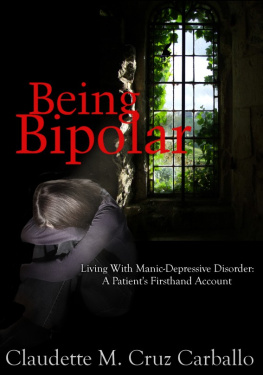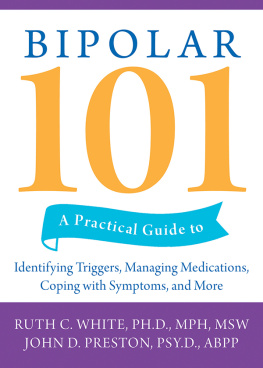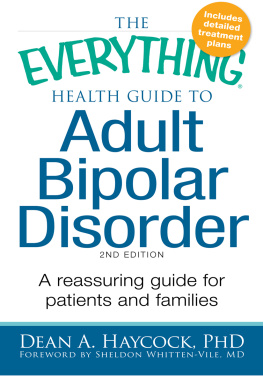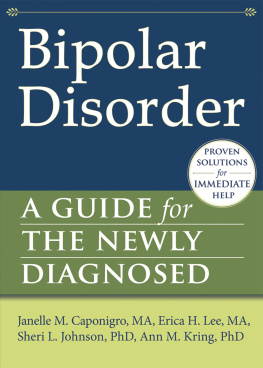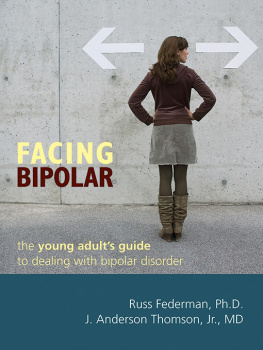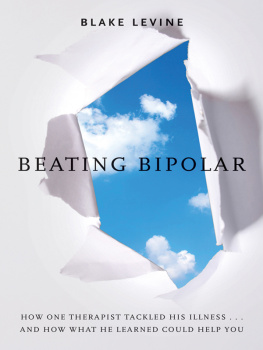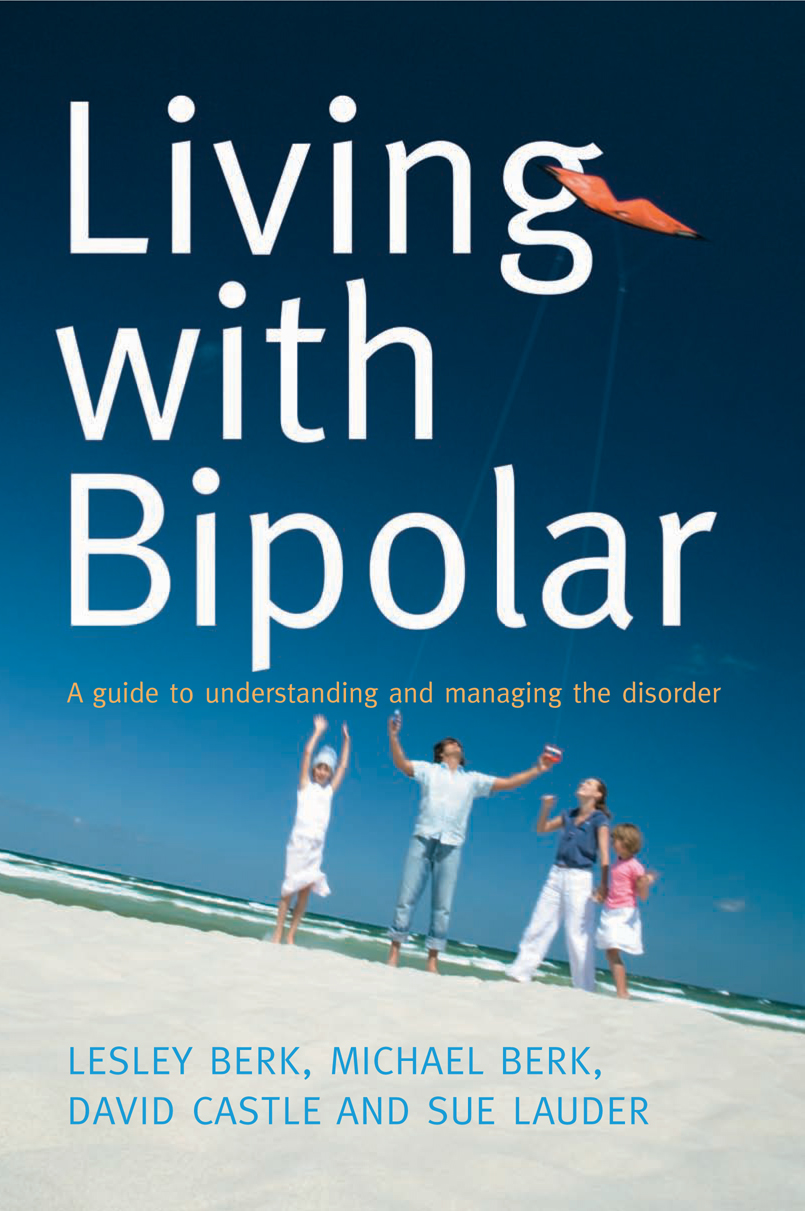Lesley Berk MA (Clin Psych) is a psychologist with extensive experience in the clinical management of bipolar and other mood disorders. She has also been involved in psychosocial research in bipolar disorder and has contributed to scientific journals and presented at conferences in this area.
Michael Berk MBBCh, MMed (Psych), FF(Psych), FRANZCP, PhD is Professor of Psychiatry at Barwon Health and The Geelong Clinic at The University of Melbourne, and heads the Bipolar program at Orygen Research Centre. He is president of the International Society of Bipolar Disorders.
David Castle MB ChB, MSc., MD, DLSHTM, MRCPsych, FRANZCP is Professor of Psychiatry, St Vincents Health and The University of Melbourne. He has published widely in scientific journals and co-authored 13 books.
Sue Lauder MA (Clin) is a psychologist and has worked in private practice and in a variety of clinical research settings as well as teaching in undergraduate psychology programs. Sue also has a nursing background working in community settings on a range of health and welfare initiatives.
Please visit
www.allenandunwin.com/livingwithbipolar
to access downloadable forms and other support materials
from the Living with Bipolar website.
Living with
Bipolar
A guide to understanding
and managing the disorder
Lesley Berk, Michael Berk,
David Castle and Sue Lauder

First published in 2008
Copyright Lesley Berk, Michael Berk, David Castles and Sue Lauder 2008
All rights reserved. No part of this book may be reproduced or transmitted in any form or by any means, electronic or mechanical, including photocopying, recording or by any information storage and retrieval system, without prior permission in writing from the publisher. The Australian Copyright Act 1968 (the Act) allows a maximum of one chapter or 10 per cent of this book, whichever is the greater, to be photocopied by any educational institution for its educational purposes provided that the educational institution (or body that administers it) has given a remuneration notice to Copyright Agency Limited (CAL) under the Act.
Allen & Unwin
83 Alexander Street
Crows Nest NSW 2065
Australia
Phone: (61 2) 8425 0100
Fax:
(61 2) 9906 2218
Email: info@allenandunwin.com
Web: www.allenandunwin.com
National Library of Australia
Cataloguing-in-Publication entry:
Living with bipolar : a guide to understanding and managing the disorder.
Bibliography.
Includes index.
ISBN 978 1 74175 425 4 (pbk.).
1. Manic-depressive illness. 2. Manic-depressive illness - Handbooks, manuals, etc. 3. Depression, Mental. 4. Depression, Mental - Handbooks, manuals, etc. I. Berk, Lesley.
616.895
Set in 11/14 pt Adobe Garamond by Midland Typesetters, Australia Printed in Australia by McPhersons Printing Group
10 9 8 7 6 5 4 3 2 1
This book is dedicated to those people with bipolar disorder
who have touched us with their suffering, taught us with their
experiences, inspired us with their resilience, and motivated us
to try to make a difference.
Acknowledgments
We want to thank supportive organisations that have facilitated our learning and research with regard to the adjunctive psychosocial treatment of bipolar disorder. These include: Beyond Blue, MBF, Barwon Health, the Geelong Clinic, the Geelong Mood Support Group, Pathways, the Melbourne Clinic, University of Melbourne and the Collaborative Therapy Unit at MHRI. In particular, we thank Monica Gilbert, Neil Cole, Reid Maxwell and Krista Scaarup. Special thanks also go to Tania Lewis for her constructive feedback regarding this book.
Authors note:
Names of people with bipolar disorder and their families have been changed to protect their identity.
CONTENTS
TABLES
AND
FIGURES
Introduction
This book aims to provide practical information about managing bipolar disorder for people with bipolar disorder and those close to themtheir partners, close relatives and friends. The idea of writing a book came from people with bipolar disorder in our treatment programs, who requested more information about their illness and its treatment. They wanted information that combined the latest research with practical, hands-on suggestions relevant to their daily lives. This information was requested not only for themselves, but also for the people important to them, to help them understand and find ways of dealing with bipolar disorder. The information we present here comes from current research findings, our clinical experience and from those people with bipolar disorder who have taught us so much about helpful strategies for living with their illness.
Bipolar disorder, previously referred to as manic depression, is about mood swings, but they are no ordinary mood swings. If you have bipolar disorder, you will know that rather than simply experiencing the usual ups and downs of everyday life, you can experience extreme highs and lows that seem to take on a life of their own independent of events around you. You may experience different degrees of these mood states, ranging from hardly noticeable to very severe at different times. You may also have some aspects of high mood combined with low mood at the same time.
These mood swings are not character flaws. They result from biological changes in areas of the brain that control mood. These biological changes respond to medication, and bipolar disorder is considered to be an illness. The illness does not end when your extreme mood subsidesrather, it is a recurrent illness that may be compared to asthma. People with asthma experience recurrent attacks, and different degrees of wellness between attacks. The thing about the attacks in bipolar disorder is that they are so personal. They bring about changes in how you feel, both physically and emotionally, in what you think and what you do. Some of these changes can have serious consequences for your safety, and affect your finances, your career and relationships. Fortunately, there are effective treatments and personal strategies for managing episodes and preventing relapse.
We include information about bipolar disorder, its causes and triggers, treatment options and ways of preventing relapse, minimising possible negative consequences and dealing with the impact of the illness on your life. Everyone finds some way of coping with their illness, but not all strategies are constructive. This book points out some of the common pitfalls that can be unhelpful or make your illness worse, as well as strategies that help. In addition, we try to address some of the questions we have encountered from patients and their families over the years. We examine ways of keeping an eye on your bipolar disorder, implementing healthy lifestyle choices and drawing up your own relapse prevention plans. You can combine this information with your personal experience and discover new ideas for managing your illness, or confirm your own successful strategies.
The strategies for managing bipolar disorder mentioned here are not intended to replace your medical or psychological treatment. They aim to assist you to be informed, get the best from your treatment and augment it with your own personal strategies.
Finding personal strategies for managing your illness has been termed self-management (Russell, 2005). Sarah Russell, an author and researcher who also has bipolar disorder, explains how misleading this term can be, as it can seem to indicate that people do it all on their own. What self-management of bipolar disorder really means is using the resources available to you for managing your illness wisely. Your bipolar disorder often affects those close to you, some of whom might have little understanding of the illness, or of how they could help. Here we provide information to assist those who care about you in dealing with bipolar disorder. We discuss ways of involving trusted others in the management of your illness, and of enhancing your relationship with your clinician. Bipolar disorder is potentially a very isolating and challenging illness, and having allies in your battle to manage it is a distinct advantage. Enjoying good relationships is part of the richness of life, and we emphasise the importance of finding people you can relate to and of maintaining good relationships.


